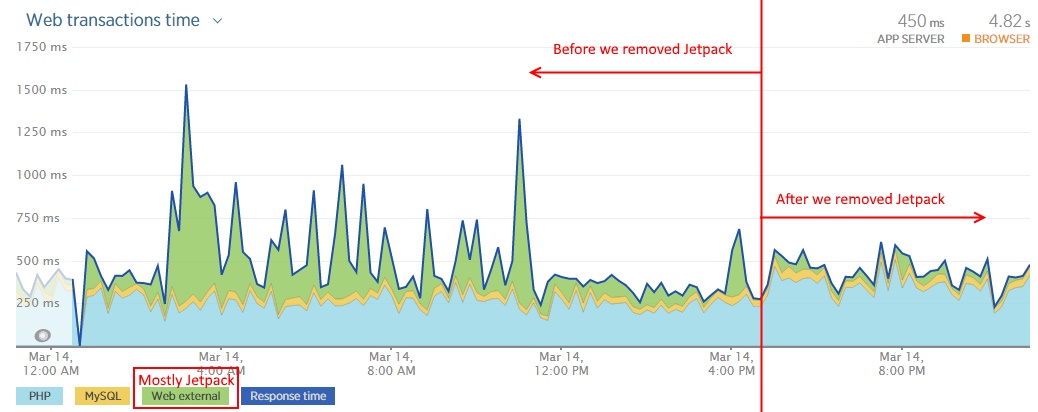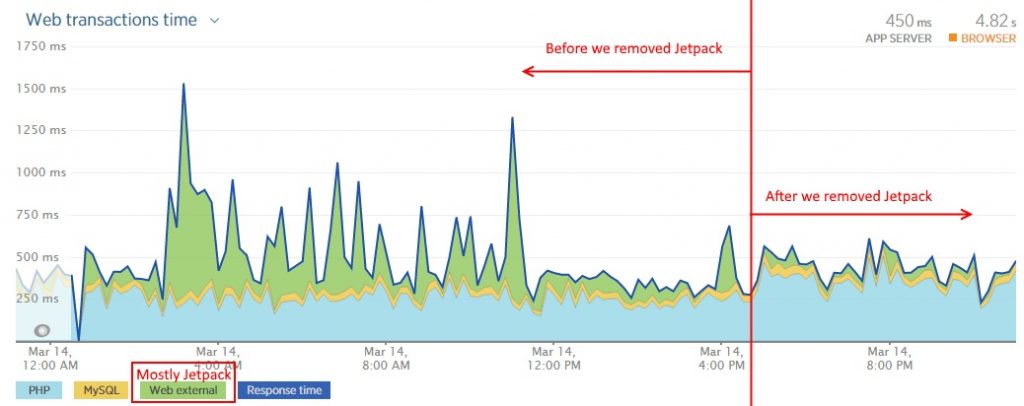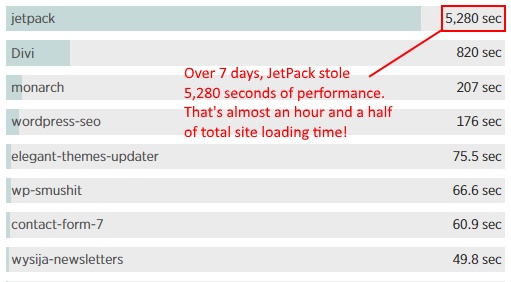How We Remove JetPack and Instantly Improve WordPress Performance by Over 50%

UPDATE – February 17, 2021: As a follow-up to Chris Lema’s February 17, 2017 post about Jetpack plugin performance, Chris has now written an excellent blog post about a new “Jetpack Boost” plugin that aims to speed up your site. Your mileage with Jetpack Boost may still vary. It is also not trivial to remove JetPack, so be sure to test, adjust, and test some more until you get the right balance of features and performance. Now, on with the original post…
JetPack is a hog. There. I said it. Many people love Jetpack for its utility and ease of use. But for as popular a plugin as it is, it sure bogs down WordPress with all of its external service requests.
One of Webidextrous’ clients was super-focused on site speed and page speed, as well they should be. Most site owners know that Google has ratcheted up its emphasis on page speed in recent years and that it has been downranking sites that are too slow.
A Quick Analysis of Jetpack and WordPress Performance
Want to know what we did? First, to motivate you even further, let’s start with the results we got. The graph below shows that Jetpack is indeed a resource hog, adding up to 1.5 seconds of extra page load time.

Nobody wants that, even if it’s just momentary. But this was happening on a regular basis, and it was adding up. Over the prior 7 days, Jetpack had “leaked” about 1.5 hours of page load time!

Yes, Jetpack can be convenient. But at this price? No thank you. It’s time to remove Jetpack.
How to Uninstall the JetPack Plugin for WordPress
Removing the JetPack plugin for WordPress is simple:
- Log into your WordPress Dashboard.
- Go to the Plugins menu on the left-hand menu.
- Find the JetPack plugin in the list and click “Deactivate” under the plugin name.
- Now, click “Delete” underneath the deactivated plugin.
Deactivation is generally a good idea as it ensures that the plugin “cleans up after itself” before it’s deleted.
That’s it! Now, on to what to replace JetPack’s functionality with.
How to Speed Up Any WordPress Website That Uses Jetpack
Our strategy was to “remove JetPack and replace it”. We picked through each of this client’s enabled Jetpack “apps”, found a suitable replacement, and installed that instead. Once we finished, we disabled Jetpack. Forever. Because we don’t want our pages to take forever to load. All told, it took a couple of seconds to remove JetPack and a bit over an hour to replace its features.
Here’s what we removed, and what we replaced it with:
| Removed | Replaced With |
|---|---|
| Jetpack Site Stats | Google Analytics for WordPress by MonsterInsights |
| Jetpack Sharing | AddToAny Share Buttons |
| Jetpack Related Posts | RankMath SEO which has a related posts feature among many others |
| Jetpack Subscriptions | MailChimp for WordPress Integration |
| Jetpack Gravatar Hovercards | WordPress Author Bio on Hover |
| Jetpack Site Accelerator | Host on Pantheon.io, which has its own CDN that speeds up your site immensely. Or, use Cloudflare instead. It covers a multitude of page speed and image size sins. You’re welcome. |
| Jetpack Extra Sidebar Widgets | The client only had images in the footer sidebar, so we replaced the Jetpack widget with the native Text widget and used plain old HTML. |
| Jetpack Widget Visibility | Widget Options |
| Jetpack Custom CSS | Honestly, we don’t know why this is even in Jetpack. WordPress already provides CSS customization natively. And people who need it usually already know this or know how to add styles to a child theme. So this is never really necessary. |
So, that’s it. Now your web server issues fewer external web requests and your site loads faster. Enjoy!
Hello,
I am trying to install the JP widget visibility and it continually triggers a “fatal error”.. Do you know why this is?
Thank you
The first thing to always try when installing a new plugin and getting an error is to deactivate all the other plugins (except the one you just installed) and see if the error clears. If it does, then re-enable the other plugins one by one, testing the page or feature, until the error occurs again. When it occurs, the problem is a conflict with the last plugin you enabled.
If that doesn’t fix the problem, change your theme to TwentySeventeen (or any earlier WordPress default theme) and test again. If the error goes away, then the issue is with your theme.
If none of the above works, you might be on your own unless you go back to full JetPack or wait for, or participate in, an update from the community maintaining this pulled out plugin. The plugin does have a thread about how this is done. See https://wordpress.org/support/topic/adopt-me-tag/
After removing Jetpack I have huge loading problem with images ? Is there any alternative plugins to solve that problem ?
Do you recall which of the Jetpack features were turned on before removal? What is your site URL so I can take a look?
For the Custom CSS module, originally, there was not UI within WordPress for custom CSS–only the file editor if you had file-editing capabilities.
As WordPress natively added more custom CSS functionality, Jetpack gives way to the WordPress implementation and only adds on anything not provided by Core. WordPress is adding more features in this area natively so I imagine Jetpack’s module will be completely deprecated at some point.
Thanks so much for this, it gave me the confidence to go ahead and just get rid of Jetpack. I’m blown away by how liberating it is!
Yes! It’s very freeing, isn’t it? Glad you liked the post.
I spent 3 days optimizing my website cause it was incredibly slow and we didn’t even release it yet! I started going through what was wordpress loading and there was an unreal amount of stuff I didn’t even knew I was using. I managed to speed up the website around 40% but it was this article of yours that finally set me free. I removed Jetpack and installed the other plugins and now pages that took 4 seconds to load are less than 2 seconds. And the amount of requests per page dropped by 30%. Thank you for your article!
Glad it helped!
I have scoured google but can’t find clear instructions for how to cancel my WP Jetpack subscription on Windows 10 laptop and deactivate. Can you help?
Are you hosted on WordPress.com? If so, I would recommend contacting WordPress.com support first, if you haven’t already done so.
Deactivating Jetpack leaves all my images broken because I was using the “Image Performance” feature. What can I do remove Jetpack without having to upload all my images again?
Ah, yes. This module is called “Photon”. What it does is act as a Content Delivery Network (CDN) for your images by serving your images not from your own server but from the WordPress.com servers. Unfortunately, the side effect is that when you turn it off your images can become “orphaned” from your site and are “not found” when the page renders.
I’ve not had to deal with this particular issue directly because I’ve always used CloudFlare, StackPath, or Pantheon.io hosting which has its own CDN (Fastly). In searching Google for solutions to this “orphaning” issue, I’ve not found a conclusive process for reverting the effects of Photon.
Some additional reading on this topic:
https://wordpress.org/support/topic/getting-to-photon-images-or-directories-for-a-restore/
https://robincornett.com/jetpack-photon/
hi i am use external url images in my site wordpress but jetpack not improve images.
i am check other site jetpack working show result
https://3.bp.blogspot.com/file-url.jpg
https://i2.wp.com/3.bp.blogspot.com/file-url.jpg
but my site not working
https://3.bp.blogspot.com/file-url.jpg
https://3.bp.blogspot.com/file-url.jpg
I am fairly certain that Jetpack will only optimize images on your own site, not external images. Unless I’m not understanding correctly what you’re asking.
great tip, disabled photon and social sharing icon from jetpack and tested page speed on gtmetrix and the number of request were down…
I have been looking to get rid of Jet Pack for some time, the only thing I honestly need it for is the auto post for social media feature which they call publicize. Do you have any recommendations as to an alternative?
Try WordPress to Buffer as a replacement for Publicize.
Thank you, I’ll give it a shot.
I am using Jetpack plugin on my birthday sites, which has many images. I don’t use Photon, but i use Lazy load images feature. Can you please review it. is it good or bad idea.
A review of Lazy Load would be a good idea. I’ll be sure to do that soon. But to answer your question here, Lazy Load is a good plugin that will help you cut load time. But an even better thing to do first is to optimize all your images. Also, before using Lazy Load, consider implementing a CDN like CloudFlare.com (they have a free plan). A CDN will position copies of your site’s images geographically closer to where a visitor is requesting them. That way a person in Australia doesn’t have to wait for an image to be sent to them from a server in New York City. It will be served to them from a server in Australia.
Ok, finally found another confirmation that jetpack did slow the site. But we need that “stats” feature, can we have it as separated plugin or module?
As a replacement for Jetpack Stats, I’d suggest MonsterInsights Google Analytics plugin. Or any of many others like it. Google Analytics will give you far better insight than JetPack Stats will.
After installing JetPack and enabling ‘CDN’ for images and ‘LazyLoading’ in jetPack, my site load time has been increased and now its performing very badly. DO I reinstall the jetpack or will is there any way to overcome this problem.
Thanks
Instead of Jetpack, try a CDN such as CloudFlare, Fastly, or StackPath. My personal favorite is CloudFlare. Also, check your hosting package. If it’s the lowest-priced, shared plan (it looks like you’re on Hostgator), then you will want to upgrade to a faster service, such as a VPS or even a dedicated server.
Frankly, I would avoid Hostgator and any other company owned by EIG. In fact, here’s an article that goes into great detail about why EIG is death for web hosting.
If you really want to improve your server speed, check out Pantheon.io. Their list price is $50/month for the basic package, but if you host through us here at Webidextrous, you can get you that same package for only $35/month. Pantheon is a lot more than most people are used to paying for web hosting, given that so many hosts offer $4.99/month packages, but you literally get what you pay for with hosting. So, why not go with Pantheon? They’ve built performance into all their offerings as a first consideration rather than as an afterthought.
Awesome list of jetpack alternative plugins. I’m getting ready to install some of them now, like Mail Poet.
Glad you like it! Thanks for stopping by.
Hi there! I quite liked this article as I would like to get rid of Jetpack too. Unfortunately, I cannot find a good replacement for the Spam comments Akismet, any idea how we could work that out. Thanks!
I’m happy to help with that. Try the plugin named “Stop Spammers”. It’s a little more complex to set up, but works well with most hosting. It also relies on communities of actual humans to report spam and “train” it. In the configuration settings you can sign up for a Stop Forum Spam API key. Then just click the green icon next to a spammy comment to report it to the community.
Hello. I am interested to remove Jetpack too after reading this post. But do you know any alternatives for Top Posts & Pages and Blog Stats widget provided by Jetpack?
Sorry for the delay in response. Try the WordPress Popular Posts widget.
What tool is that on the print captures?
What’s in the screenshot is a performance measurement tool called NewRelic. It’s very powerful and useful for fine-tuning the performance of any WordPress site. If you’d like it for your site, I can sign you up for hosting with a Pantheon Performance plan for a monthly cost starting at $125. That’s $50/month less than their list price. I’ll even migrate your site to Pantheon for free.
Wow this is really a lovely article, do you know that my web takes 6seconds to load but after deactivating the jetpack it loads 3-4seconds ..thanks admin.
I’m glad you saw the same results we saw! 🙂
HI, I have wanted to get rid of Jetpack for a while so when I read your article i thought I’d finally do it. I did and a lot fo my images changed size and My contact me and social share buttons vanished. There may have been other things too. I’m still quite new to this so I got scared and re set up Jetpack. Please help! Thanks.
Sure. I can have a look. I’ll contact you privately to ask for more info.
Hello sir
Thanks for your post. I just wanted to ask that if I should disable and uninstall jet pack plugin, hope it won’t affect my sitemap because it was site map generated by jet pack I used to submit my site url /stemap?
Thanks
I would suggest doing a test of removing JetPack from your site. You can set up a free dev/test staging environment by signing up at Pantheon.io for a free account. If you decide to host there, let me know and I can give you special pricing.
Except for comment #1 which references your site with the jetpack graph the rest are no longer live links
“This site can’t be reached”, and
“groverj35john.wordpress.com is no longer available. This site has been archived or suspended for a violation of our Terms of Service.”
and so on … Might want to clean that up but I get it if you are really busy 😀
Joe
I really appreciate you letting me know about the trackback links having expired. I hardly ever scroll down to that portion of this post when reviewing it, so it completely escaped my attention. I’ve corrected that list to just the ones that still work. Thanks.
Great question. One of the frustrating aspects of improving WordPress performance is that every performance tool seemingly provides a difference response. I don t know exactly how Google Analytics tests speed as opposed to the Google Page Speed Tool and YSlow, etc, etc. That s why we like Pingdom s test, because of its simplicity. The waterfall shows you each object on your page and how much it contributes to your load time. Simple. It gives you specific, granular data that you can make decisions with.